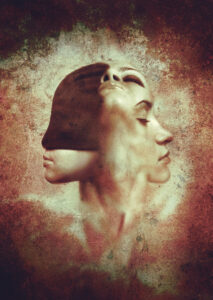
Malta, a small archipelago in the centre of the Mediterranean, has played a pivotal role in the commerce and politics of Europe, Africa and Asia since people travelled across that sea.
In the Second World War, as a British colony, Malta was of critical strategic importance to the Allied forces while the right wing military might from Germany and Italy were eager to posses it. The fight for Malta was hard. My granny recounted that one day during an air raid she was helping to nurse injured civilians in one house when she was called to another site to help and, as she walking away from the building she had been in, it was flattened by bombs.

While my granny was dodging bombs, my mum was beginning her life in the crucible of war. They were both lucky to survive. The world was lucky that Malta resisted the invasion. That resistance to the invasion would have had no chance if three World War I biplanes had not battled in the skies above Malta against the new fighter jets of the Italian Regia Aeronautica bombers as they launched against Malta in June 1940. The biplanes were old and made simply from wood and cloth, but they could turn quickly to slip between the heavy bombers and modern fighters darkening the skies.
If it had not been for the courage of the Maltese and their colonial allies Malta would have been overrun and the Axis forces might well have overpowered the Allies. In recognition of the bravery and courage of the people of Malta, Britain awarded the country the George Cross “for acts of the greatest heroism or for most conspicuous courage in circumstance of extreme danger”. That symbol of courage, solidarity and sacrifice remains displayed on the Maltese flag.
The underdogs managed to resist the massive barrage that Malta suffered until reinforcements brought food, fuel, and better planes to support the people of Malta. Later, after those first tenuous weeks of the battle for Malta the crews that flew and manned the biplanes named them “Faith”, “Hope” and “Charity”, in part reflecting the three Cardinal Virtues associated with the Catholic religion which was fundamental to the culture of Malta. The story of valour, courage and collaboration told by Kenneth Pullman in his book Faith Hope and Charity is exciting and uplifting and filled me with a love of Malta and the Maltese, a beautiful people with big hearts.
Faith
Faith, hope and charity are noble sentiments, praised as virtues.
But, what is faith?
“Have faith. Give your troubles over to god. If you believe in him he will help.” I hear this every day. I might reply with “god be with you”, a comforting response to the greeting.
But, despite an upbringing imbued with Christian practices, mantra and dogma, I’ve thought hard about my beliefs and I don’t believe in god and try to limit my reliance on faith, the kind of faith that asks for duty without evidence of reason or return. The payback offered in exchange for this faith is supposed to be “eternal salvation”, “heaven”, “peace”, even “riches”. There are miracle stories that support the conjecture that there is an external power which decides the fate of everything and can choose to condemn or uplift you at will. But evidence is lacking.
Faith or belief is a funny notion though. It seems difficult to pin down because it encompasses objects you can see and ideas you can not. I believe that I am sitting on a chair is reasonable because everyone can see and touch the chair. I believe in goodness is not so easy, though a definition of good can generally be agreed on. I believe in god is even more difficult because god is, like goodness, not something you can touch, but also because it is not so easy to agree on what god is. While everyone is likely to have some agreement on what goodness is, it is unusual to be able to agree on what god is and often there is violent disagreement on what god is. As we decried in Common Sense:
At the worst extreme, “God” was used as an excuse to kill. Religion was an instrument of war. Too many violent hot-spots of the world were inflamed by religious doctrine. It was mad that wars of religion, like that in Northern Ireland and the Middle East, were a part of daily news in this modern age of internet, flight and cloning. People killing others in the name of love and peace!
This hypocrisy was obvious at the extreme of “killing in the name of god”, and that opened your eyes to the insidious corruption of society and daily lives, as “god” was used as an excuse to exclude, to mislead, to control. There were a lot of “good” people going to church, temple, or mosque on one day and screwing the world on the next. Violence and deceit were hiding even behind the robes of piety. People sometimes turned a blind eye to injustice, selfishness and inequity even on the way to and from church, mosque, synagogue or temple.
So when you are asked to “have faith”, to do so would require you to abandon reason. In fact that is what is being asked of you: “Have faith. You will be saved and all will be good. Abandon reason. Believe me, if you have faith you will be looked after.”
While you are able to consider opposing hypotheses (a phenomenon of the human mind which allows us to perceive things that don’t exist, which no other living species can do so) reason allows you to evaluate them and even choose which is “right”.
It can confusing to play with these words, “belief”, “faith” and “reason”, in one’s head. Are they the same? Are belief and faith the same? They seem to be, but what part does reason play in faith or belief? Is faith belief without reason? Is belief with evidence reason?
Perhaps you’ve heard the tolerant expression: “Everyone is entitled to their opinion.”
It sounds reasonable until that opinion affects your life. And surely it is fair that everyone has their own opinion. And yet, somehow it doesn’t feel as though that is what is being suggested.
In the excellent TV show The Big Bang Theory by Chuck Lorre et al, exchanges between Sheldon, the astrophysicist, and his mother, the devout Catholic, can feel excruciating as your mind is pulled between reason and faith: Sheldon would explain the science and his mother would refute the science with her faith in god. She might say “You can have your opinion too, Sheldon!” as if to suggest that they were equally reasoned!
How could anyone argue with an unreasonable person, a person who is not open to new information which might influence them to change their opinion?
So perhaps these words, “faith”, “belief”, “opinion” and “reason”, need to be sorted out.
For convenience we might start by saying belief and opinion are synonymous, while the belief/opinion can be obtained via faith or reason. Then faith and reason are at opposing ends of a spectrum with unsubstantiated beliefs, or what science might call untested hypotheses, at one end where evidence is lacking, to the other end of the spectrum where beliefs are supported by evidence or reason, being tested hypotheses.
An untested rationale for why the sea is blue could be “There is blue dye in the water”.
A tested hypothesis is a complicated reason about refraction and filtering of sunlight entering and bouncing around the earth’s atmosphere.
If you believe in god and you are still reading, thank you. You are patient and tolerant because you know what is coming.
The trouble with faith is that it is, by definition, unreasonable. It pollutes the mind by substituting imaginings for reality. If someone is talking to you about faith in god they are asking you to suspend reason because they have no evidence to believe in god; they demand you have faith!
Faith is superstition and superstition is not a healthy thought process. Normally we ridicule it. Once upon a time, in prehistory when humans had no evidence for the way the world worked, many patterns of behaviour were evident but not explainable. Responding to these patterns, with ritual, was a start. For example: “It’s unlucky to walk under ladders.” That might prevent you getting a bucket of paint spilled on you as you walk under, but it’s not going to affect your choices elsewhere. This kind of confusion and misconception of the ritual (“not walking under ladders”) perpetuates ignorance and dulls awareness. Better to be aware and look up if a ladder is in your way.
As hominins emerged from palaeolithic lifestyles, habits among small but growing bands of hominins (including neanderthals et al) were adopted to help survival. Sometimes habits proved so helpful they demonstrated reason and might become rituals. For example, the recognition by repeated experiment (tasting/eating) that certain mushrooms would kill you, others would give you visions, while others could be food. Some rituals were distorted and became religious as fables associated with the rituals were presented as realities. We have forgotten that the stories were never real, so that now we perform cultish behaviours and justify immoral behaviour with delusions of deity, eg “god says kill the heretics”.
If we can not move from faith to reason it is not possible to progress the mind of humanity. But it is not so easy to relinquish the comforts of religion, which offers answers which need not be challenged, in fact which may not be challenged! Religions promise fantastic rewards and offers comforting community to societies. Today, despite the technologically advanced world humans have created, most people, 84% according to a Pew Research poll from 2016, adopt a religious practice.
It was easy to reason for me to reasonably stop believing in god, but giving up any religious practice unwittingly left a gap in my life. After a while it became apparent that it was a lack of spiritual practice. In abruptly and completely rejecting religion and unreasoned belief, I inadvertently went cold on spiritual practice. But I had felt, experienced and recognised the spiritual dimension of existence since childhood and, being a spiritual person (as we all are), realised after some time that it was important to separate religion from spirit. That was easy to do. It was a relief. It was comfortable to seek and rely on reason and evidence, especially in a world built on reason (a.k.a. “science), while nurturing your spiritual capacities with reflection, thought, and connection with existence. This kind of spiritual practice was similar to a physical or intellectual practice (eg going for a jog or reading a book), though it was not as well researched as physical or intellectual realms, accessing and nurturing a spiritual practice was easy because it is a natural phenomenon of being human, it is a phenomenon of the emergence of consciousness in existence. And the benefit is a sense of liberation and reconnection with life and nature. It’s worth it!
Hope
Bishop Desmond Tutu has a fun name, doesn’t he? And he offered the world a pleasant, smiling face that spoke reasonably for goodness. He was a key figure in the fight against South African apartheid and continued to work for equity and freedom around the world.
Tutu also highlighted the impending destabilisation of life on earth being induced by human caused climate volatility. Once at a large gathering in London where he spoke at length about the growing signs of danger, he was asked how he could remain optimistic when the trends are so negative.
He replied: “I am not optimistic. I am a prisoner of hope.1”
That expression is telling. He knows that the reality is desperate and being optimistic is delusional and unproductive. He lived through the brutal South African regime of apartheid and knows that pretending that bad things are good is unhelpful. He owns up, in order to continue to be motivated he must believe that the future will turn out alright, or at least that it can. Reality is bleak but the remote possibility that life will be saved keeps him positive. Hope.
In that gathering in London Tutu explains that it is his faith that keeps him hopeful. He is a Christian and notes that in the Christian mythology a man, named Jesus who was also god, was executed by humans and so all seemed to be lost (The Crucifixion of Christ) but then, the story goes, three days after being buried this god/man became alive again and then left Earth to go to the ethereal realm (The Resurrection of Christ). So, “phew” everything is OK.
Unfortunately that thinking is neither reasonable nor applicable to all people. It is unreasonably reminiscent of ancient Babylonian, Egyptian, Greek and Roman mythology in which humans have superpowers. And clearly if you don’t “have faith” then this story is not applicable to you, and that applies to most people. Although the story is denied by nearly 70% of people world-wide, astonishingly in this age of flight, mobile phones and virtual reality over 2 billion people still say they believe this legend of the man/god who was killed and came back to life. A bit weird in the age of virtual reality, AI, space travel, but no miracles.
Tutu’s rationale for being a “prisoner of hope” went on. He spoke about the goodness of people which is his cause for hope. In the Jesus mythology the people turn a blind eye when the hero, an activist for political change, is on for trial for a misdemeanour alongside a thief, and the jury of the crowd votes to save the crook and execute the activist. Nevertheless, Tutu continues to point out the goodness in people, and he has a point.
Hope is closely related to the superstitions of faith. It is a belief that random events will not be random but are biased in your favour. The ego-centric mindset is a natural starting point. Protecting oneself is basic survival. But as Tutu pointed out humans have capacity for altruism. In fact altruism is particularly human. It is an essence of collaboration which allows humans to do supernatural things, from building pyramids to flying to the moon. In being altruistic people let go of their ego and give consideration to others’ interests. And it is this phenomenon that Tutu knows is what can help humans to move from systems of greed and fear to collaborative, nurturing dynamic systems. But this is not about hope, it is about facing reality and choosing to behave differently. Choose.
So when hope is the rationale for expectations, rather than reality, hope distracting us from reality. Our attention is complacent, uncritical and selfish. Selfish because we prefer the deluded hope that we will get what we want instead of facing the reality of situations and working out what can be done to get a desired outcome. Hope is free and easy and therefore attractive, especially since we do not know what the future holds and doing nothing but hoping “might” give the results you want, while the alternative challenge and cost of problem solving is unappealing. Sadly hope rarely works, and instead it increases the costs and challenge of progressing to a desired result.
No, hope is not a solution and becoming a prisoner of hope is a painful incarceration. To escape that jail takes thought and courage and altruism. Tapping in to our altruism allows us to think about the bigger picture and recognise that facing reality and taking personal action is actually less costly and painful than doing nothing. That is certainly the case for communities and whole populations, yet it is also true for families and individuals.
Unfortunately media brainwashes us to think that we can all have everything without paying the costs: Cheap food, cheap clothes, effortless work, permanent holidays, … “money for nothing and chicks for free”. Clearly foolish notions which ignore the realities of life: The cheap is cheap because people are not compensated for work and costs are lumped on to nature and poor, weak communities that are bullied.
And even the cheap food and clothes and the easy jobs do not make us happy. We still complain and want more. We decry the oppression of manual farm labour and sweat shops and the export and dumping of garbage on poor communities, while we buy more cheap imported food and clothes and fill the garbage with more packaging and broken promises. Hope is not going to change that. Changing our choices does.
Charity
Perhaps charity will solve the inequities we see. So we put some cash in the pot when it is passed along the pew, or we volunteer to pick litter or feed homeless people, or perhaps we establish a foundation to do good works, to feed, home or educate the poor, to help addicts or others in difficulty, or even to save the environment. When we do that we feel good and worthy and might even be praised for the contribution we make.
Charity is a powerful illustration of the altruism in us all. Giving resonates with the deep altruism that is fundamental to humans. Even evil people exhibit altruism. It is a part of being human.
In a world which prioritises competition, the scale of charity is laudable. It offers a way for people to make the world a better place and most people voluntarily give, even those who have little. It seems that those with little give far more time and cash as a proportion of their wealth than those whose names appear at the top of the list of charitable giving.
America has produced celebrity philanthropists who are world famous, which is good. But does the “good” justify the means that created that good? Not in our world.
Andrew Carnegie is a famed philanthropist from the early 1900s, who funded hundreds of libraries and other public facilities across America. Perhaps you’ve heard of Carnegie Hall. But few people have an inkling of how Carnegie accrued the wealth. He was from a Scottish immigrant family and played a tough game in the late American industrial revolution, rapidly expanding the industries of steel and railways. He was brutal and many people died because of his avaricious tenacity and callous indifference to the welfare of others. He cheated and stole to get more power and was famous for his sangfroid. It was not until his later years that he had a reckoning with himself and started to realise the inequity of his life. Then he started to give, perhaps in a naive hope of “redeeming his soul”. Although philanthropy is no justification for theft or murder, Carnegie’s criminal rise to wealth is ignored, while his philanthropy is praised.
One example like Carnegie today, is Bill Gates whose ruthless business practices at Microsoft cheated many competing entrepreneurs out of their technology and economic opportunity and also corrupted the whole computing industry resulting in the dominance of a bloated, unstable and insecure operating system worldwide. Tech savvy observers do not use Microsoft for security critical applications; webservers rarely run Microsoft operating systems. And yet many still applaud Gates for his charity, the Microsoft Foundation, which supports its own political agenda. Gates proposes solutions for global problems, but they are tainted with his feudal political mindset. A simple recent example is the capital he accrued via Moderna, his pharmaceutical company which supplied mRNA gene therapy during the Covid-19 pandemic without proper testing, poor quality control (many samples contaminated with spurious DNA) and the emerging evidence of many people’s immune system subsequently degrading (autoimmune dysfunction eg thyroid volatility).
In both case, Carnegie and Gates, the philanthropy was made possible by the feudal theft of common wealth, by cheating and by sacrificing the well-being of others for one’s own aggrandisement.
It is hard to imagine the depth of depravity human society might have sunk to if there had been no charity to balance the greed and fear-mongering in the growth of human population and development. Charity, philanthropy, and self-sacrifice (sometimes to the extent of martyrdom) reflect the altruistic essence of humanity. Even in torturous environments charity happens.
But why does it not happen from the beginning. We all start life benefiting from the love and care of our mothers and close families. And hominins, basically vulnerable bags of flesh, only survived palaeolithic dangers like sabre-tooth tigers and ice-ages by helping each other – altruism is a human superpower. Why is it so difficult to emulate that pattern? Why do we not adopt social and economic practices that engender human virtues, but instead promote survival behaviours of ignorant systems? It is not even that we can compare our behaviour favourably to more “primitive” species (eg neanderthals) or communities (eg indiginous North American tribes) because they demonstrate more balance and less inequality than modern “developed” societies.
Examples of balanced communities today are all but extinguished and pushed to the periphery of the modern world. When Christian colonialists visited the Americas they tortured and killed people and stole wealth. It was justified by the laws that circumscribed their world, but, as today, many laws were not based in reasoned morality but on unreasoned patriarchal, hierarchical rules. The Spanish Inquisition is a bloody illustration of that “justice” system. And those supremacist laws and culture still poison the world, encouraging patriarchy, power accretion and control of common wealth like land, water and natural resources.
If you can bear to explore current events you will see many communities consumed by suppression and violence against women and minority groups, fighting between neighbours and the ongoing justification of vicious behaviour by the enactment of laws encouraging this behaviour. Today’s list includes genocide in Israel/Palestine, the war in Ukraine, disenfranchisement of women in Afghanistan and Iraq, military posturing in the South China Sea, escalation of nuclear threats, murder by police of civilians in America, and more. In all these arenas philanthropists are working to liberate the oppressed and share resources more equitably. But their efforts are small in comparison to the weight of carelessness, money, bombs and energy that those in power apply to abuse others.
If the world was enlightened, if behaviour reflected the advanced state of knowledge and technology vested in humanity, the global culture would be very different. There would not be a demand for charities because charity would be a part of the way of life. Mutual respect would engender care for others and those with power would voluntarily share and assist people around them to share in the world. There would be no demand for Oxfam, the World Wide Fund for Nature, Amnesty International, Greenpeace, Medicins Sans Frontiers, and so many others, large and small who seek to balance the pyramid of power because systems would take care of the weak, promoting equity and interdependence among all life.
Charity is a good thing, it is part of the enlightened consciousness, but when it exists as an add-on to society rather than a core part of its behaviour, it is a sign that society is not performing as it could, as it should. So in our world of having everything all of the time, the existence of charity as a counterbalance to the systems of economics and politics shows that we are failing, that humanity’s system remains corrupt and emulating survival behavipour patterns, but does so with advanced technology which could nurture enlightened systems but instead pollutes and kills Earth.
Without Faith, Hope or Charity
Many apologists for the power-mongers say “It’s always been like that”, “People are like that”, “People won’t change”. But that is self-serving ignorance. Humans would not exist if we did not collaborate and work together, looking after one another. We would have been devoured by big cats or frozen out by the ice-age if we did not exhibit collaboration and altruism, along with creative problem solving.
Realistically if homo sapiens did not have a strong inbuilt altruistic tendency we would not have raised enough children to perpetuate the species. No one survives on their own. It is simply not possible. We are completely incompetent as infants and remain largely so for many years only achieving physiological and mental maturity after 25 years or so of life. So today, in this space age, the lack of altruism in our systems is a glaring sign of failure and a harbinger of doom.
Is there any hope? Of course! People like to hope. It is a straw to hang on to when all seems lost. Hope can preserve some sense of sanity in a deeply depressing or seemingly terminal situation. But hope is not a strategy for change. Hope is not a path to success. Hope stands in the way of humanity.
When we recognise faith, hope and charity for the challenges they signal we can start to seek real solutions. Solutions start with awareness of the situation and opportunities to change behaviour. When that awareness translates in to changing beliefs, what is talked about and then changing behaviour, then our system will naturally emerge to a more integral, balanced and thriving world.
Developing awareness starts with yourself. As we know ourselves we become able to choose more clearly and let go of the fears and desires of a beast striving to survive. Instead we enjoy the world that is and could be and stop fuelling the pyramid of power, lies and pain. Instead we can choose to be human.
- At the Social Good Summit 2011 he was asked “What advice do you have, as Elders, for keeping optimism and how do we nurture skills within ourselves for aiding social change”
Archbishop Tutu answers the question. “I’m not an optimist, I am a prisoner of hope”. He discusses the power of his faith and the good in humans.
https://www.youtube.com/watch?v=BiZduBO2bQM ↩︎





Comments